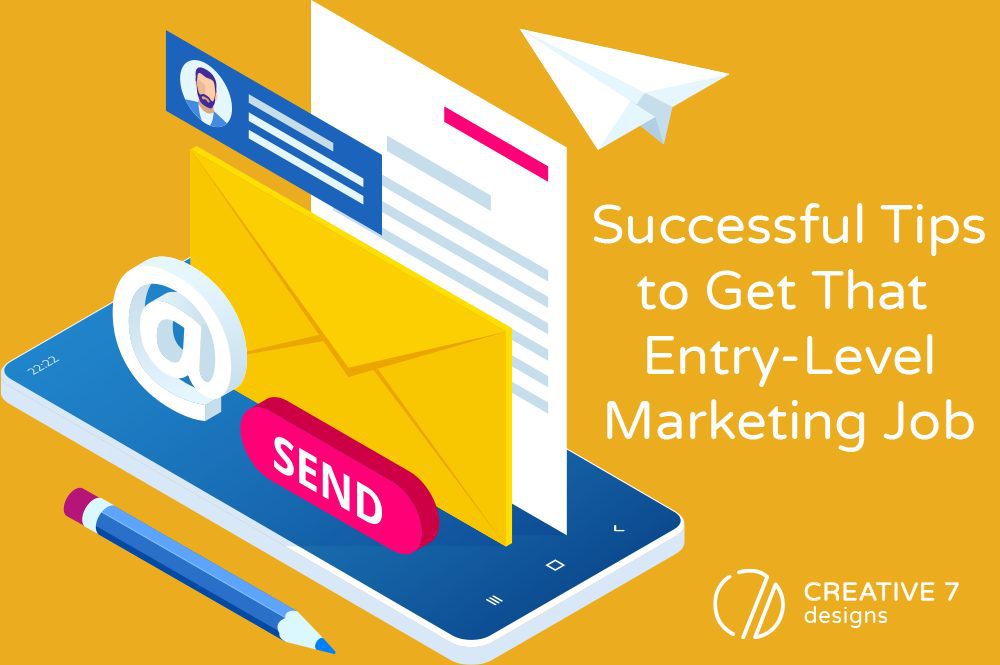Overview: These marketing agency tips will help you in your hunt for an entry-level marketing job (even if you have minimal to no experience).
Finding an entry-level job in marketing can be a job in itself, especially if you have no experience. And, if we’re being more transparent, finding any job even with experience is hard these days!
Though the job market seems to be over-saturated with “open positions,” including what seems to be tons of marketing jobs, many job seekers are finding it almost impossible to actually make it to the job offer.
If you’re someone who’s interested in marketing, here are 6 things you can consider that could boost your chances of finally getting hired into that entry-level marketing role:
Get Certified
Stay Updated
Hands-On (SMBs, Freelance, Intern)
Build Your Portfolio
Get Social
Apply, Apply, Apply
In general, though, it might be beneficial to first understand what’s going on with America’s job market so you can determine if your lack of a job is a them thing or a you thing. Let’s skim this topic a bit before getting into our entry-level marketing tips.
Making Sense of America's "Broken" Hiring System:
Some statistics taken from the Bureau of Labor Statistics regarding jobs and unemployment might be shocking:
8.4 million potential workers are unemployed.
There are a record 10.9 million jobs open.
What we’re seeing is that job seekers are finding “an incongruity between what they are hearing about jobs and what is actually happening.” And, based on the statistics, it’s true. Things simply don’t add up.
So, here’s the gist.
There are technically “a lot” of jobs (we’ve seen “help wanted” signs plastered onto storefront display windows, large banners hanging from buildings, and even nailed to those wooden electric poles).
The problem isn’t the lack of jobs in comparison to job seekers. The problem is that the jobs that are available aren’t necessarily jobs many people are interested in.
Related: Why Everybody’s Hiring But Nobody’s Getting Hired
So we have a better understanding of the job market. For all you future marketers reading this, though, it doesn’t have to be a rat’s race. Let’s talk about 6 things you can do to better prepare yourself for an entry-level marketing job.
1. Get Certified:
Here’s a secret: You can teach yourself digital marketing skills without the need for an expensive college degree.
Think about it.
Are colleges covering things like search engine optimization (SEO)? Programmatic ad buying? How to run effective paid search campaigns? Conversion rate optimization? Leveraging influencer marketing?
No, they’re not, but a career in one of these fields can net you a six-figure job with just a few years of experience.
“There are a lot of fancy certifications out there – some of them cost a fortune and a lot of them are useless,” says this article.
To build your professional persona online, showcase your certifications once you receive them! Put them on your resume and post them on your LinkedIn profile.
2. Stay Updated:
“Keep up with what industry leaders are reporting and trying in their own marketing campaigns. […] you can learn from the trends they’re noticing or the new campaigns they’re launching.” — The Muse
Subscribe to newsletters or read articles on sites like Social Media Examiner, the Content Marketing Institute, and MarketingProfs.
Many experts publish case studies based on real brands and real campaign results that can give you deep insights on marketing strategies and best practices! It’s literally free information (thanks, Internet).
Doing this will also help you better identify people and companies you might want to work for and the areas of marketing you’re drawn to and may want to specialize in down the line.
Pro tip: Use the information from staying updated later on in your interviews — show recruiters and hiring managers that you’re up-to-date on industry trends and can apply the info to benefit a particular business.
3. Hands-On (SMBs, Freelance, Intern):
Before applying to your first professional digital marketing job, it’s a good idea to test your new knowledge and start some hands-on work. This part is crucial because it’ll make the next point much easier!
“Since you’re just starting out, you shouldn’t focus on making money, but on helping people grow their online presence and gaining valuable experience to build your portfolio.”
Related: 7 Ways to Get Entry-Level Digital Marketing Jobs in 2022
How can you do this?
Source Small Business Owners: Some people have the luxury of being surrounded by small businesses. Most small business owners aren’t well versed in digital marketing so you could pput your expertise to work by offering your services to them.
Jump onto a freelance site… or several: There are many options to choose from that don’t cost you a dime. This will give you the opportunity to build your credibility and lead to more interest in your work.
Find an internship: Finding one of these things is as easy as one Google search… seriously. It’s even easier if you’ve followed these tips and have already earned some certifications that can back up your interest.
4. Build Your Portfolio:
If you’re applying for a social media, digital marketing, or design-focused role, you’ll need a portfolio or some samples of your work. A website presenting your work isn’t always required, for example, depending on the job. You could simply have a leave-behind page showing your work, or add a PDF attachment to your resume.
Your samples should be professionally presented and relevant to the role you’re applying for.
Remember, you spent all that time from the previous point building up your credibility, so you should have some good stuff to show by now.
Put your best work forward and be able to speak to what you did confidently so employers know that you know what you’re talking about.
Read more about this point (and others) here.
5. Get Social:
We mentioned social media a bit in point 2, but this is different. In this point, we’re focusing more on using your social media to network.
Nearly half of all inbound marketing job postings on Indeed.com contained the words “social media marketing” or “social media management” in their job listing.
“Since your interviewers will likely do some background research on you to see how active you are on social media, make sure you go through your social media profiles and remove anything that would portray you in a negative way.” — Weidert
This is a great tip. We live in the most digital world we’ve ever lived in, so the likelihood of getting your social media profiles checked out by employers is, well, high.
The reality is that businesses want employees who are a good representation of the company, not ones who post unprofessional things online that could also tarnish their reputation.
– Get that LinkedIn profile set up with a professional profile picture
– Remove those embarrassing public Facebook photos
– Delete those obscene Tweets you might have made in the past
It all counts. Trust us.
6. Apply, Apply, Apply:
After all, BLS statistics basically prove the old adage “the more, the merrier true, as it’s been revealed that job seekers who apply for:
21 to 80 jobs have a 30.89% chance of receiving a job offer
11 to 20 jobs have a 29.48% chance of receiving a job offer
more than 81 jobs have a 20.36% chance of receiving a job offer
Check out this article for a list of entry-level marketing jobs to apply for, and additional tips.
Up those chances at getting that entry-level marketing job, and apply! You can be picky, but don’t be stingy. You deserve this win, future marketer!
In Conclusion:
Are you feeling a bit more prepared to apply to that entry-level marketing job at your dream company after reading these tips?
Now if there’s one thing to keep in mind before jumping into these tips, it’s the employer’s expectations vs. your responsibilities as a marketer.
In an article published by Grow and Convert, one point is made that marketers/employers don’t have a clear cut test to indicate whether someone will be effective in their marketing role.
For those with experience, you might’ve grown your last company’s site traffic from x to y% during your time there, but even that isn’t the best indicator for future success in marketing.
Related: Why Marketing Has Become The Hardest Position to Hire For
Hopefully, the tips we’ve shared can help anyone — degree or not — in their hunt for the perfect marketing role. Because, as one source said: What school someone went to isn’t a good indicator of how successful they’ll be in a marketing role anymore.
So get out there, get some hands-on experience that you can speak to, and start applying… and don’t be afraid to apply to many different places!
ARTICLES YOU MIGHT LIKE:


